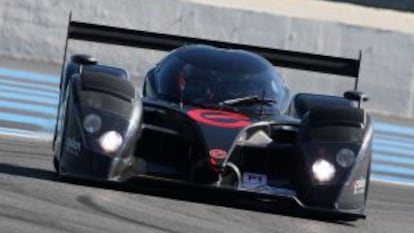The failed electric car that cost the Spanish government €17 million
Public prosecutors accuse the Basque Country-based promoters behind Hiriko of fraud

In the freezing cold of the early hours of January 24, 2012, outside the headquarters of the European Commission in Brussels, a group of engineers was desperately trying to dry out the electronics of a tiny prototype electric car using hair dryers.
The car in question was called the Hiriko and was produced by a small Spanish company based in the Basque Country. A few hours later, the then-president of the European Commission, José Manuel Durão Barroso, posed for the media alongside the inert vehicle.
But Durão Barroso was not put off. He had dubbed the project to build the electric car “part of the response to the crisis that would revitalize traditional industrial sectors to meet new challenges of urban mobility.” But 16 months later, the firm collapsed before the car, developed on the basis of a design by the Massachusetts Institute of Technology, could go into production.
Of the 20 prototypes promised at the launch, just one car was completed, with two more half finished
The story of this urban electric car is that of the failure of a business venture funded almost entirely with public money: €17.4 million in total – €14.7 million from the Spanish central government, and a further €2.7 million from the Basque regional government. The Spanish courts are now investigating the affair, with public prosecutors accusing six businessmen of creaming off part of the funding for themselves.
Prosecutors say the businessmen, who all have links to the Basque Nationalist Party (PNV), set up various front companies “so that all profits would revert to the accused” if the project was a success, but that if it failed, the Spanish and Basque regional governments “would not recover the investment.” They cite such alleged irregularities as the use of subcontractors with no employees; the purchase of a prototype racing car that had nothing to do with the project; and the location of the company’s headquarters in a building owned by one of the promoters, where a large piece of work commissioned by Hiriko was carried out, and the rent was way above the market price.
Hiriko’s owner, Jesús Echave, made his money in construction, and was appointed by the PNV to sit on the board of the Kutxa savings bank, which was restructured in 2011 and 2012. His Italian Wikipedia page describes him first as a “racing car driver” and second as a businessman. He reportedly has an impressive collection of historic vehicles.
Project Epsilon: a race to nowhere

A commission set up by the Basque parliament to investigate the Hiriko case concluded last summer that public money was mismanaged by a small group of people with close ties to the region’s government. It reached the same conclusion in relation to a €50 million project to build a racing car and Formula 1 team called Epsilon, which had been the genesis of the Hiriko. Epsilon’s founder, Joan Villadelprat, now faces trial for misappropriation of public money.
The Epsilon project was carried out under the PNV government in the Basque Country, while the bulk of the subsidies for Hiriko were the result of negotiations between the PNV and the Socialist Party in 2011. After the Popular Party took office in 2012, it called for the money put into Hiriko to be returned. The PNV, which heads the Basque regional government, has refused to do so, saying the prototype was developed, but it was the sales and marketing aspect of the project that failed.
Echave was at the unveiling of the Hiriko in January 2012 alongside Durão Barroso. The idea was to install fleets of the vehicles throughout cities around the world that could be hired and dropped off like bikes, reducing traffic and contamination. The cars’ components would be made in the Basque Country and then shipped to the likes of London, Berlin, Lisbon, Barcelona, Boston, San Francisco, Singapore and Rio de Janeiro to be assembled. Projected annual sales were between 24,000 and 60,000, which would generate turnover of €720 million, creating around 6,000 new jobs in the Basque Country.
The car received a lot of publicity, appearing on the Discovery Channel, as well as in The New York Times, The Guardian, and other leading newspapers.
Rodolfo Rieznik of Economists Without Borders says the collapse of Hiriko highlights the need for regulatory bodies to exercise greater control over publicly funded projects: “We live in a world of financial and accounting fictions.”
Carlos Martínez Gorriarán of the centrist UPyD party told Congress that the case was about “buddy capitalism” whereby profits are private, and losses, public.
José Luis Bengoechea, who has been targeted in the investigation over the affair, blames the collapse of the company on the economic crisis, insisting there was no wrongdoing: “Everything will be cleared up very soon. We’ve been left penniless, but it was a magnificent project. If only things had gone as they were supposed to.”
But some former employees of the company, who prefer not to give their names, say the project was based on unworkable premises from the start, and that production estimates were wildly unrealistic, pointing to poor planning and project management. Most say they had the impression that their bosses had no idea about how to run a company.
In the end, of the 20 prototypes promised at the Brussels launch, just one car was completed, with a further two half finished. And these were much simpler designs than originally promised. Of the three patents behind the project, two were never used because they were too expensive, say some workers, who are still owed their wages. They say they did everything in their power to get the Hiriko on the road – including, it seems, using hairdryers.
Tu suscripción se está usando en otro dispositivo
¿Quieres añadir otro usuario a tu suscripción?
Si continúas leyendo en este dispositivo, no se podrá leer en el otro.
FlechaTu suscripción se está usando en otro dispositivo y solo puedes acceder a EL PAÍS desde un dispositivo a la vez.
Si quieres compartir tu cuenta, cambia tu suscripción a la modalidad Premium, así podrás añadir otro usuario. Cada uno accederá con su propia cuenta de email, lo que os permitirá personalizar vuestra experiencia en EL PAÍS.
¿Tienes una suscripción de empresa? Accede aquí para contratar más cuentas.
En el caso de no saber quién está usando tu cuenta, te recomendamos cambiar tu contraseña aquí.
Si decides continuar compartiendo tu cuenta, este mensaje se mostrará en tu dispositivo y en el de la otra persona que está usando tu cuenta de forma indefinida, afectando a tu experiencia de lectura. Puedes consultar aquí los términos y condiciones de la suscripción digital.









































